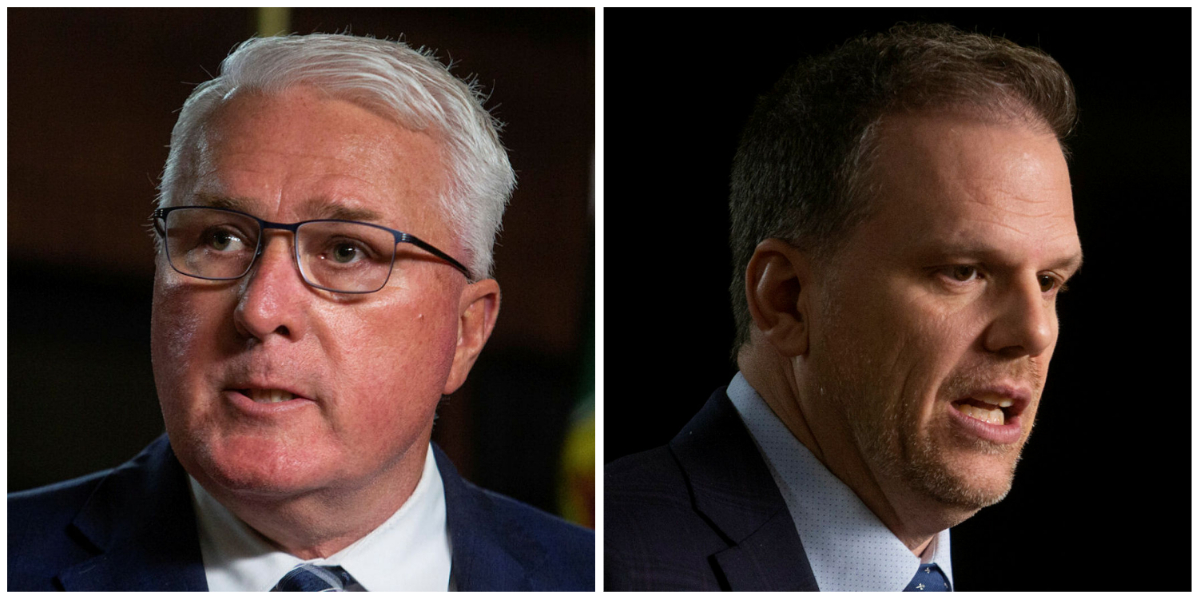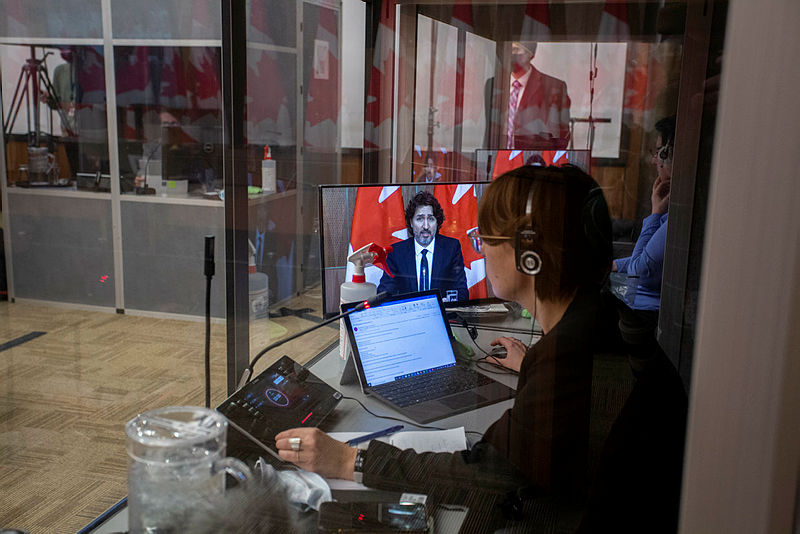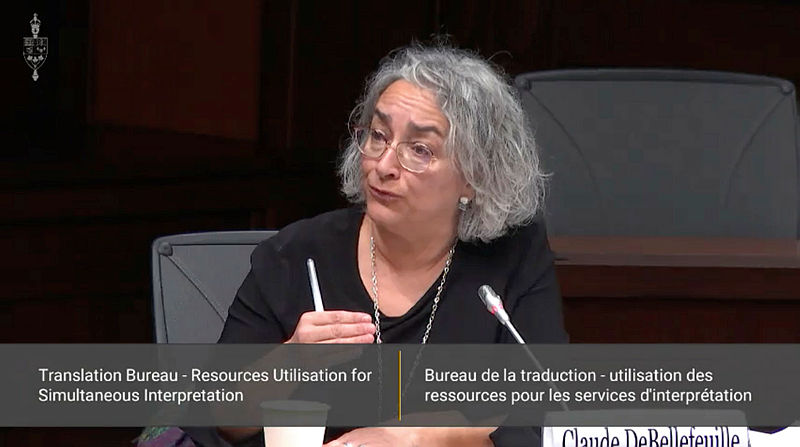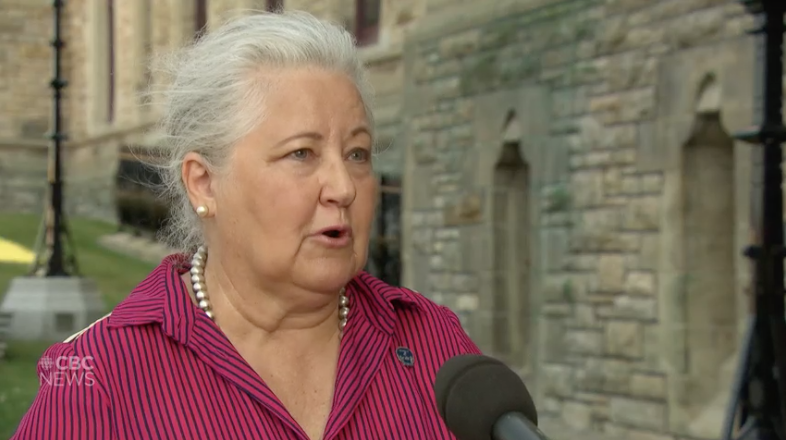Tory House leader rails against interpreter pilot project defended as necessary amid service strain

A union and an association representing Hill interpreters are lambasting the House of Commons’ decision to launch a pilot project testing the use of remote and external interpreters, and Conservative House Leader John Brassard is adding his voice to the chorus of those arguing it will threaten the quality of bilingualism on the Hill.
During a closed-door meeting on May 19, the House Board of Internal Economy (BOIE) approved a six-month pilot project proposed by the House administration to test two things: the use of external interpretation services (as in interpreters not accredited, employed by, or on retainer with the federal Translation Bureau), and the feasibility of allowing interpreters to work remotely. The first technical feasibility tests related to the pilot—which is set to run until December—took place on July 19 and 26. An interim report is due by September.
The Canadian Association of Professional Employees (CAPE), which represents staff interpreters with the bureau, and the International Association of Conference Interpreters Canada (AIIC) have both been highly critical of the BOIE’s in camera decision, with AIIC advocacy lead and freelance interpreter Nicole Gagnon calling the project “an attack on the quality of service we provide” and saying it will “threaten” the quality of bilingualism on the Hill.
The House administration says the decision was made in light of the Translation Bureau’s inability “to meet the demand for interpretation services using their current resources,” with the pilot seen as a potential route to “overcome present limitations,” as per an email response from Melanie Wise, head of House corporate communications.
The use of “external and/or remote interpretation services” through the pilot will be “an adjunct to the current services provided by the Translation Bureau, with a preference for the use of Translation Bureau employees and freelancers when available,” reads the email. Remote interpretation is being tested as a way to “potentially expand the pool of available interpreters beyond those who reside within the National Capital Region.” Wise said the technology being tested “uses the existing infrastructure of the House of Commons, including Zoom.”
The BOIE’s decision included conditions that the bureau be involved in “every step of the implementation plan and that the systems implemented meet current quality standards,” noted Wise. According to the bureau, it was not consulted on the decision to develop the pilot, though it’s been in talks with the House about the possibility of off-site interpretation “for some time.”
Only willing freelance interpreters on retainer with the bureau are taking part in the pilot, and the bureau has indicated that its freelancers won’t be asked to work in teams with “non-accredited freelancers.”
Brassard (Barrie-Innisfil, Ont.), a member and spokesperson of the BOIE, said along with concerns about quality if non-federally accredited interpreters are being used, he’s concerned about security and the potential for interpreters testing the feasibility of working remotely—outside of the ISO-standard compliant interpretation booths—to sustain injuries in the process. Since 2020, the House has installed new, noise-limiting interpretation consoles in all 17 committee rooms and two multi-purpose rooms.

An interpreter works in a booth during a media availability with Prime Minister Justin Trudeau on Feb. 16, 2021. The Hill Times photograph by Andrew Meade
“In part, the reason why this interim report was requested by September, [was] to not just understand how the technology is going to work, what services can be used, but also the other concern about the security and the vetting of security for those outside interpreters,” he said.
To become federally accredited and work for the bureau, interpreters sit an accreditation exam. To do so, they must meet one of a number of criteria, including having a university degree in conference interpretation or having at least two years of experience as a conference interpreter for a recognized organization like the United Nations or the European Union. Those who fail to pass—and, based on bureau vice-president Matthew Ball’s Feb. 17 testimony at the BOIE, new master’s program graduates—go through a two-year training internship program to reach the accreditation standard deemed necessary for supporting Parliament. To work for Parliament, interpreters also undergo vetting to attain a “secret clearance” security status.
Long faced with a dwindling workforce, the bureau has repeatedly spoken to its efforts to find and hire all available qualified interpreters, including snapping up the three to five master’s program graduates each year.
Brassard pointed to the Joint Declaration of Emergency Committee as an example of his concern with the pilot: “That committee moves in camera and there isn’t somebody with the proper security clearance, who’s not even in the room … how do you know if they’re not in the room that all the proper security measures are being taken into account, how the meeting is not being recorded, and how, from a security standpoint, the information in that meeting isn’t being compromised?”
In a follow-up email, Wise said “all interpreters who work for or at House of Commons events, regardless of their employer, must pass a stringent security screening process.”
Wise noted only events or meetings supported by the House are part of the pilot, meaning meetings of cabinet or the National Security Intelligence Committee of Parliamentarians aren’t. The Senate is not taking part in the pilot. Asked whether any types of House proceedings are off the table for inclusion in the pilot, she said the House is “still in the feasibility and assessment phase,” with no such decision yet made.
Already facing challenges pre-COVID, the federal interpretation service that supports Parliament has been strained amid the pandemic, with interpreters reporting increased rates of injuries from covering hybrid virtual proceedings. In a brief submitted to the BOIE in mid-April, CAPE said since the House began using Zoom, the number of hazard reports—of injuries from ear pain, to headaches, to tinnitus—filed by its members has “hovered between” four and 18 per month, compared to between four and 23 per year pre-pandemic, “with no perceivable downward trend.” A January 2021 survey by the AIIC found 70 per cent of the 51 staff interpreters who responded reported experiencing auditory injuries—88 per cent of which required time off from work to recover—and 43 per cent indicated they were now experiencing “persistent symptoms.” Last fall, a study by the National Research Council—the results of which have been disputed by the House administration—pointed to the House’s audio-visual system as the cause of “audio signal degradation” that’s caused injuries to interpreters.
To try to protect its workforce, the Translation Bureau has reduced working hours, increased the number of interpreters assigned per hybrid event, and requires a technician be “present at all times in the room where interpreters are located,” among other precautionary measures.
Still, its workforce has dwindled, with a 26 per cent drop in freelancers on retainer, from 76 in 2019-20 to 56 this year. As of April, the bureau has 54 staff interpreters, 10 of whom are now working part-time to allow for more rest based on advice from their doctors, according to bureau CEO Lucie Séguin.
Meanwhile, committee activity—and, in turn, the demand for interpretation services—is on the rise. As House clerk assistant Ian McDonald told the BOIE in December 2021, there’s been a “significant increase in committee activity” over the last decade, with committees sitting longer and hearing from more witnesses. Between the 41st and 42nd Parliaments, for example, the average number of hours of House committee meetings rose by 49 per cent.
The strain on the service has affected both House and Senate work, as was seen during the last sitting, with multiple instances of committee meetings cancelled due to a lack of support resources. Regional and special interest caucuses have been unable to get interpretation support from the bureau since early in the pandemic, same with federal departments (including for technical briefings), and other Parliament-related events.

Bloc Whip Claude DeBellefeuille pictured during a BOIE meeting on Feb. 17. Screenshot courtesy of ParlVu
With committees once again allowed to travel, Bloc Québécois Whip Claude DeBellefeuille (Salaberry-Suroît, Que.) raised concern over the added strain it could put on the service at the BOIE on June 16. As confirmed by McDonald, she noted only one committee—the House International Trade Committee—hires interpreters locally when it travels abroad, and “interpreters will be accompanying the other committees” that undertake travel.
The House is set to resume hybrid virtual proceedings when it returns on Sept. 19, through to at least 2023.
The Conservatives have consistently been against the idea of allowing a hybrid, virtual Parliament, for reasons beyond the strain being experienced by the interpretation service. But the strain has added to their arguments against.
The pilot is “not a viable solution to a problem that can be fixed simply by returning to in-person sittings,” said Brassard.
Liberal House Leader Mark Holland (Ajax, Ont.), a member and spokesperson of the BOIE, said the idea that simply ending virtual proceedings would end the strain on interpreters is “utter fantasy.”
“This is a situation that predates the pandemic, a lack of interpreters,” said Holland. He noted the number of witnesses appearing virtually before committees was on the rise pre-COVID, and “that will only continue and grow.”
“We’ve been trying to find a solution for a long period of time now … the number of interpreters who are available just can’t meet the demand,” he said.
Holland said it’s “hypocritical” for Conservatives to point to the “workload caused by a hybrid system” as the problem, “when they are the ones pushing to add additional committees,” referencing the creation of special committees. “All these additional committees require additional translation services,” he said.
Asked about criticisms that the pilot threatens the quality of bilingualism on the Hill, Holland stressed that it isn’t about replacing existing interpretation services.
“What we’re talking about is going from no service to service. So right now we have meetings, parliamentary meetings, that are taking place with no [interpretation] whatsoever, and the quality of that service is exactly zero,” he said. “We’re letting perfection be the enemy of good work. … We have to render ourselves a bit flexible to find solutions.”
Speaking to the remote interpretation aspect of the pilot, Holland said “one of the biggest problems that the interpretation service has is people don’t necessarily want to move to Ottawa,” but are able and “happy to work remotely.”
He noted the Board has directed the House to ensure “that the quality of service be at the same level” as that of the Translation Bureau.
Asked about Brassard’s concerns regarding security, Holland said “there are all kinds of leaks—the origin of those leaks are almost entirely MPs who decided for their own personal reasons to break rules around privacy to send something out for whatever political purpose they’re aiming to achieve.”

The AIIC’s Nicole Gagnon, pictured during an interview about the pilot project with CBC News. Screenshot courtesy of the CBC
Gagnon said by involving both non-accredited interpreters and allowing interpreters to work offsite, away from House technical support staff, the pilot is a “double whammy against quality.”
“The Parliament of Canada has always received, and should continue to receive, the best quality interpretation available from qualified, or if you will, accredited interpreters, accredited by the Government of Canada itself—where they are called upon to sit an exam—and in the proper conditions to do the work,” she said.
CAPE vice-president André Picotte said his union was “shocked” by news of the pilot.
“It’s almost an insult to the Canadian public, because in effect what they’re doing is they’re respecting the letter of the law—I’m talking about the Official Languages Act and all those regulations connected to that law—but they are not respecting the spirit of the law,” he said. “It’s not enough to translate one word in English to another in French … It is very difficult to provide quality interpretation services, and we feel that the bureau at the moment is the only one who can provide such quality service.”
Picotte noted that reading body language is important to interpretation, and having interpreters work remotely could “diminish” that.
The House has said any external providers “would need to be prepared to meet high-quality service standards and ensure the availability of fully qualified interpreters,” noting that along with the bureau’s accreditation process, there are other provincial qualification standards, professional certifications, and graduate degrees in the field.
“What the bureau of translation is providing is quality and quality assurance, because our interpreters are supervised and the quality of their services is verified periodically,” said Picotte. “It’s not enough to have one examination.”
Gagnon said the federal accreditation exam is the “gold standard,” and none of the provincial associations that provide certification require interpreters to sit an exam, “so there is no direct verification of the competencies of these interpreters and their skill to interpret simultaneously.”
Gagnon said simply ending hybrid virtual proceedings “won’t be a solution,” echoing Holland’s point that virtual participation was on the rise pre-pandemic.
While repeating calls for more federal investment toward training interpreters, Gagnon suggested some solutions “in the immediate term.” For one, she said the bureau lacks “flexibility” and doesn’t “use all available resources efficiently.” Currently, it schedules shifts the evening before based on availabilities gathered the first week of the month prior. But in the private sector, to which government departments have turned, she noted many providers ask for availability two to three months out, meaning there’s a “big contingent of accredited freelance interpreters who are already booked” by the time the bureau does its rounds. In turn, Gagnon suggested introducing an electronic calendar whereby interpreters can “input their availability in real time.”
She also suggested the House look at having committee meetings more evenly spread out, including in the evening, over five days of the week, rather than concentrating work on Tuesdays, Wednesdays, and Thursdays. “It may not be popular … but we’re in a crisis,” she said.
Picotte said the way to solve the problem is to address the health and safety issues facing interpreters, including by fixing the House’s audio-visual system and ensuring Parliamentarians use the proper, provided microphone headsets.
The Hill Times





 LICENSING
LICENSING PODCAST
PODCAST ALERTS
ALERTS













